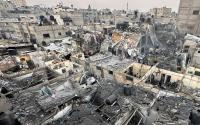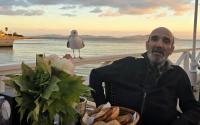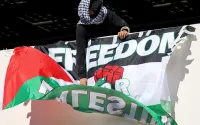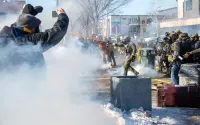Jason Burke, an expert on Afghanistan, has covered the conflict since day one. From Peshawar he warns that the Alliance strategy is fatally flawedThe Observer, Sunday October 21, 2001 Kandahar, the spiritual and administrative heart of the Taliban, was quiet. I sat in a small office down a narrow lane not far from Mullah Omar's house with the young assistant of a senior Taliban official and talked - of Islam, of the West, of Afghanistan and of the blasts that, 10 days earlier, had demolished two American embassies in East Africa killing 224 people and injuring 4,500. The young Talib asked me if I thought the Americans would attack Afghanistan. After all, he said, Osama bin Laden, the prime suspect, was known to be hiding there. 'No,' I said, 'they wouldn't be so stupid.'
Six hours later, 75 Tomahawk missiles had turned four empty terrorist camps in the east of Afghanistan into piles of rubble. Within two days, outrage had exploded throughout the Middle East and bin Laden had been made a folk hero. My confidence in the good sense of Washington's decision-makers looked slightly ridiculous.
Yesterday morning, 200 US Army Rangers, who shout: 'Rangers lead the way, sir, yes sir' when they salute superiors, engaged Taliban soldiers about 20 miles from where I had sat chatting to the young Talib.
My overwhelming sense is of bewilderment. Like anyone who knows Afghanistan, who has driven the long, rocky roads under that impossibly clear blue sky, who has dropped a few notes to the urchins who shovel dirt into the potholes to earn their dinner, who has seen the double amputee landmine victim cheering his friends playing football, or heard the Kabul dogs howling in the night after a rocket strike on the north of the city, I simple cannot understand how it came to this.
Nobody can argue with the aim of the war. Justice for the 6,000 dead in New York must be done and seen to be done and destroying bin Laden and al-Qaeda is an integral part of that. And, if civilians have to die, then too bad, civilians always die in war. But this war, as it is being fought, will not make the world a better, safer place. It will make it far more dangerous.
The Islamic militia's leaders may be bad but they are not mad. They have a coherent ideology fusing modern, resurgent Islam, the centuries-old customs of the Pashtoon tribes, from which they are largely drawn, and a bizarre nostalgia for the simple, predictable village life that they imagine existed before the Soviets forced them into a life of refugee camps and war.
Mullah Omar, the reclusive, one-eyed cleric who leads the movement, and his top commanders believe, with some justification, that they rescued their country from the violent anarchy of the post-Soviet years. You cannot bomb these men into submission. Nor will the Taliban footsoldiers be particularly worried by the forces ranged against them. Whoever advised the Americans to mock the Taliban's antiquated weaponry in the ludicrous, boasting broadcasts to Afghanistan last week had not done their research. Many of the first mujahideen fought the Soviets with muzzle-loading muskets or First World War-vintage Lee Enfields.
Nor is threatened destruction much of a disincentive. After a revolt in the western city of Herat in March 1979, the Soviets carpet-bombed the city, killing between 5,000 and 25,000 people. It did nothing to deter insurrection. This time, Taliban casualties have been almost farcically light and the damage done has been minimal. We are told that the Americans have knocked out the Taliban 'command and control centres'. I have seen many of these. They largely consist of a man sitting on a rug with a radio, an ancient, unconnected telephone and the mother of all teapots.
There are signs that the Americans - and the British Government - are beginning to comprehend this and the near impossibility of tracking down bin Laden. Even if the Taliban are rolled back to a rump of territory in the southern strongholds, bin Laden would still have plenty of boltholes.
The Afghans are now falling in behind the Taliban. The strikes are swiftly radicalising what was an essentially moderate country. That is not only tragic but dangerous. A few days before the 1998 strikes, I asked a guard outside the foreign ministry in Kabul about bin Laden. He did not know who I was talking about. Nor did the men in Guldara. Two years ago, few Afghan fighters I spoke to could point to their own country on a globe, let alone discuss the Israeli-Palestinian conflict. Now, of course, they all can talk about the 'Amriki' and its zulm or 'tyranny' against Muslims.
So no defections, no coups against Mullah Omar, no handing over of bin Laden are likely - just a steady rallying to the Taliban flag, mounting civilian casualties, growing extremism and an unfolding humanitarian disaster.
Yesterday, we got a taste of what is to come. Domestic opinion in the US and the UK, the approach of the Muslim holy month of Ramadan and the growing fragility of the coalition mean that 'a result' is needed within a month. The Americans are likely to commit hundreds more ground troops, probably with the SAS hanging on to their camouflaged coat-tails, in an increasingly desperate bid to get their man. It is difficult to exaggerate quite what a disaster for everybody that will be. The Northern Alliance would be permanently tarred as Western stooges, the rest of the country would take their guns and go to fight the invaders. So, as they have told me repeatedly in recent weeks, would all the commanders currently watching developments from Pakistan.
Zarameen is an old friend from Jalalabad. He fought the Soviets, fought the puppet regime that Moscow left behind and fought against the Taliban until forced into exile. Three weeks ago, he asked me if I could arrange for him to get weapons to fight them again. Yesterday, he told me he was getting ready to defend 'his country'.
Western troops in Afghanistan just wouldn't win. They would be forced, like the Soviets, into isolated, fortified firebases. The idea of 150 US or Royal Marines dug in on some hilltop in Nangahar facing 1,000 Zarameens doesn't bear thinking about.
There has to be a pause in the war. Some carefully bought defections could strengthen the Northern Alliance. That would shock the Taliban. Funds and weapons could be channelled to those within Afghanistan, or based currently in Pakistan, who would be happy to see the end of Taliban rule. More pragmatic elements within the Taliban, who are concerned about the damage Mullah Omar is doing to their country, can be wooed. The instinctively moderate, flexible nature of the vast majority of Afghans can be used to our advantage if we stop forcing them to take sides. We should tell the Taliban that the bombing will stop for a set period so that a conference, that will include them, can meet to discuss the future of the country and of bin Laden. If they do not agree, the attacks can start again, preferably after Ramadan. In the meantime, flood the country with aid and talk about addressing the real causes of terrorism and Islamic extremism: poverty, repression and skewed policies in the Middle East.
When I think about the huddled masses of the refugees, about the small, stone-covered graves that are appearing outside every village, about Mohammed Ghaffar, the white-bearded waiter at Kabul's battered Intercontinental hotel who grimly counted off the regimes that have successively run and ruined his country on his fingers, I know we have to halt the escalation before it is too late. But when I listen to Rumsfeld and Bush and Blair and Straw and their macho, ignorant and fatally flawed rhetoric it is hard to be optimistic.






